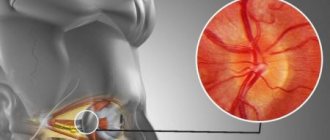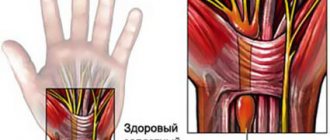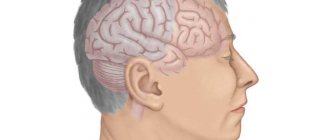Good day! All people sooner or later face problems, unpleasant situations and the like. Some manage to cope with the current difficulties, and they can continue their happy and joyful life. But others dive deep into negative emotions and begin to look at life in dark tones. It is these people who have a neurotic personality type. Neurotic – who is this? As a personality type, he views the world exclusively through negative events. For him, no matter what happens, everything is bad.
Symptoms of neurosis
How to recognize neurosis? There are a number of symptoms that may indicate that something is wrong with a person.
- Physical symptoms of anxiety: excessive sweating, rapid heartbeat, dry mouth, chest pain, etc.
- Psychological symptoms of anxiety: a feeling of loss of control, a person feeling that he is “going crazy”, fear of sudden death, etc.
- Low emotional stability.
- Excessive worrying or rumination.
- Anhedonia (decreased or lost ability to experience pleasure) or lack of interest in previously enjoyable activities.
- Apathy and constant fatigue.
- Constant feeling of sadness and helplessness.
- Irritability.
- High susceptibility and sensitivity, increased vulnerability.
- Frustration when solving ordinary everyday problems.
- Rigidity, difficulty accepting changes in the environment.
- Interpersonal problems (with family, friends, at work) due to lack of tolerance towards other people. Usually gives rise to coexistence problems. In the most serious cases, this can lead to psychological abuse.
- Tendency towards social isolation.
- A person tends to keep problems “to himself.”
- Tendency to shyness.
- Tendency to develop phobias.
- Difficulty making decisions.
- Difficulty leaving the house.
The presence of any of these symptoms does not necessarily indicate neurosis, but if several are observed at once, you should seek professional help from a psychologist.
Psychological component
Psychology says that a patient with neuroticism is dependent on public opinion. For him, someone else's opinion is more important than his own principles.
Who are neurotics?
- Individuals who are constantly afraid of making mistakes and not living up to other people's expectations. They are afraid of society's condemnation.
- They cannot stand criticism and need encouragement and gratitude. When receiving a remark, they perceive it as a betrayal. Most jealous people are observed among neurotics, since they constantly suspect their partner of infidelity, even without any reason.
- The immersion in trouble is very deep and it is not always possible to cope with negative emotions on your own. He needs to feel attention from others, as he cannot tolerate loneliness.
Neurosis and insomnia
The state of anxiety caused by neurosis can provoke insomnia. Thus, problems falling asleep and/or staying asleep at night prevent you from getting proper rest. This contributes to increased irritability and worsens previous symptoms. This is another aspect closely related to depression.
Take the innovative CogniFit neuropsychological test for insomnia and find out in less than 30-40 minutes whether you have cognitive symptoms that may indicate a sleep disorder. Receive a detailed report in pdf format with personal recommendations!
Useful tips for insomnia
- Maintaining a daily routine. Try to go to bed and wake up at the same time every day, and avoid changing your sleep-wake cycle.
- Sports activities. Sleep quality improves with activities of moderate duration and intensity. Avoid intense exercise a few hours before bed. Find out how to start exercising.
- Don't sleep during the day! This is highly not recommended for insomnia. If you feel very sleepy, you can take a short nap, but it is better - no more than 20 minutes and no later than 16:00.
- Avoid stimulants. Try not to drink drinks containing caffeine, theine, etc. 4-6 hours before bedtime. It's the same with tobacco and alcohol!
- Light dinners. They help avoid stomach discomfort and promote better digestion.
- Drink moderate fluids before bed. If you drink too much liquid, you may wake up needing to go to the toilet. If, on the contrary, you drink too little, you may wake up in the middle of the night from thirst. We need to find a “golden mean”.
- Relaxation before bed. Warm shower, relaxing music, a nice book, some relaxation exercises.
- Go to bed only if you really want to sleep. Otherwise, you may begin to associate your bed with your inability to sleep. Therefore, it is recommended to get up if you do not fall asleep within 20 minutes after going to bed. Return to bed when you feel sleepy again.
- Improve your bedroom. The room you sleep in should have dim light (if you can't sleep in the dark) and a pleasant temperature. Avoid using electronic devices and other stimuli that may activate your body and/or mind. Also remember that constantly checking the time on your phone will not help you sleep.
- Exposure to natural light. Daylight helps maintain a balanced level of melatonin, a hormone produced in the absence of light that influences the proper sleep-wake cycle.
Types of neuroticism
In psychology, there are 3 types of neurotic disorder. The main point that unites them is the constant search for a sense of security.
Subordinate
A neurotic, as a personality type, is subordinate and experiences a constant need for protection. He needs to feel next to him a person who is ready to protect him from the difficulties of life. He is like a child on a permanent basis, hiding behind his mother's skirt when faced with troubles.
Important point! The subordinate feels weak and unprotected, lacking the willpower to cope with difficulties on his own. Therefore, he is forced to constantly ask for help. The first priority is to feel safe. Feelings of love and approval are in last positions.
Aggressive
This category of people is difficult to communicate with. This personality type prefers self-defense. Has a strong desire for power, to gain permissiveness and ensure security. He will not take into account other people's opinions and listen to advice from others.
For this person, everyone around him is an enemy, guilty of all his troubles and failures. It is extremely rare to see such a person happy; he usually prefers to blame the environment for everything. A person is aware of his fear of being left alone and subsequently feeling helpless, and he is ashamed of this. In order not to encounter this, he rushes ahead in order to achieve power. The aggressor is a good strategist, but has great difficulty in coping with failures. I am ready to turn myself inside out just to achieve the desired result. Even the choice of a life partner is considered not based on feelings of love, but to strengthen one’s own influence or position.
Separated
A type of personality that prefers to escape from problems by solitude. Maintains a detached behavior from others. Communication with people is minimal. He thinks that those around him want to cause him any harm, they want to impose their own path in life, depriving him of independence. The isolated person does not want to be dependent on others, and does not care about other people's opinions. If an aggressive neurotic encounters solitude, he does not understand what to do next with the independence he has gained. Thoughts about worries take over the mind and lead to deep stress. If the isolated person plunges into himself and distances himself from others and understands that there is no benefit in this, he, on the contrary, will begin to strive for people in search of protection from them.
Feelings of fear and anxiety for no reason: how they manifest themselves and methods of treatment
Neurosis and problems with attention and memory
As we have already seen, neurosis is associated with anxiety, which, in turn, is closely related to problems with memory and attention, since excessive anxiety leads to decreased concentration. Use calendars, diaries, notes, lists and other similar tools to help counteract anxiety. Memory training and various hobbies are also very useful, as well as vitamin supplements (preferably of natural origin, such as ginseng or guarana).
Do you want to improve memory, attention and other cognitive functions in yourself and your child? Train your brain's core abilities with CogniFit personal cognitive training! The program automatically identifies the most weakened cognitive functions and suggests a training regimen that suits you! Exercise regularly 2-3 times a week for 15-20 minutes, and within a few months you will be able to notice improvements. The program is recommended for children over 7 years old and adults.
How to improve memory and attention. Useful tips
- Exercise stress. We already mentioned this above, but we want to highlight it again. Exercise is very good for managing anxiety and stress.
- Distractions - away! One of the biggest distractions is your cell phone. When performing any task or work, it is advisable to turn it off or leave it out of reach. Doing more than one thing at the same time (multitasking) is detrimental to attention.
- Take breaks. Periodic breaks from study or work help our brains relax. After a short break, the task will be completed more efficiently. Carefully! Taking too long breaks won't do you any good.
- Change of activity. Boredom reduces performance, so it is advisable to avoid routine.
- Classical music. It has been confirmed that listening to such music is beneficial for attention and concentration.
- Train your brain! Use, for example, online memory training, games from the “find the differences between pictures” series, searching for a specific letter or object among many others, etc.
Physical activity for neurosis
Definition
A neurotic is a person who has emotional instability, increased anxiety, and preoccupation with himself and his own problems. Thanks to the definition, the disorder can be described:
- A person who constantly experiences anxiety, fear and disappointment.
- Experiences fear of performing even simple tasks that a priori should not cause problems.
- A neurotic person feels unsure of his abilities and questions his own actions. For example, I’ll give you a teacher who teaches at a university. Students like him and his colleagues respect him. But the teacher himself is afraid that his teaching is useless, uninteresting and that he is considered a bad person. Although he has never faced such condemnation of his personality in his life, the fear is still present and does not decrease.
Treatment options

When contacting a neurologist, the patient's history and symptoms will be examined. It is important to find the factor that provoked the development of the disease and eliminate it. After this, the doctor will decide on a treatment regimen, prescribe the necessary medications and provide recommendations.
The main treatment recommendations are:
- normalization of the daily routine (sleep at least 8 hours a day, eat 4-5 times);
- reduction of mental stress.
The following medications may be prescribed to treat neurasthenia:
- tranquilizers (for example, Grandaxin);
- taking B vitamins;
- medications that provide additional nutrition to the brain (“Actovegin”);
- antioxidants (Mexidol);
- products that strengthen the body’s defenses (medicines containing iron);
- drugs to normalize sleep (“Phenazepam”);
- tincture of hawthorn or valerian;
- taking tonics (ginseng, Chinese lemongrass).
It is important to understand that long-term use of psychotropic medications can cause dependence and increase symptoms.
In addition, the patient may be prescribed physiotherapeutic treatment. A course of massage and aromatherapy has a positive effect.
It is also useful to visit a psychotherapist, listen to auto-training and use the feedback method.
The following methods are used to treat neurasthenia in a child:
- a change of scenery and a vacation;
- drinking teas with soothing herbs;
- taking relaxing baths;
- parents need to avoid conflict situations in the family in the presence of the child;
- moderate physical activity, sports and proper rest.
In addition to medicinal methods, folk remedies are very popular. For example, you can use decoctions of valerian root or motherwort, oregano, strawberries, rose hips and raspberries.
Neurotic love
A peculiar manifestation of love is a feeling on the part of a neurotic. He never gets enough attention. He resorts to any means to get what he wants, even scandals and intrigues. He strives for consolation, calmness and support from his partner, while he himself does not want to show willpower or demonstrate his abilities.
The neurotic wants everything to be the way he wants it. He concentrates exclusively on his desires, demanding that his partner fulfill them. If a partner is tired and wants to rest, then the neurotic perceives this as a lack of love for him.
A neurotic will never leave his partner alone. Loneliness makes him anxious, so he always wants to know and even be where his loved one is. He can harass you with calls and talk about empty topics. A neurotic is demanding and capricious, small and unhappy.
Only a codependent relationship is possible with a neurotic person, when one demands and takes, and the other fulfills and gives. If a neurotic is denied help or the realization of his desires, he will perceive this very painfully.
In love relationships, the neurotic constantly makes himself the victim. He presents himself as a defenseless and weak person, on whom not everything depends. It evokes feelings of guilt and pity in the partner. He may cry or suffer in front of his partner.
Being prone to anxiety, a neurotic always commits indiscriminate and obsessive actions.
- On the one hand, he needs kindness, advice, and help.
- On the other hand, he wants to make others happy. He can help, while inside he remains hostile, picky, and demanding.
He cannot sensibly evaluate his words and actions, which others may not like, which is why he does not understand their behavior. Thus, other people always remain to blame, and the neurotic himself simply considers himself misunderstood.
go to top
Diagnosis of neurosis
First of all, the baby is examined by a pediatrician to rule out diseases of the internal organs.
Next, the neurologist continues the diagnostic search, excluding damage to the nervous system. A neurologist may prescribe additional instrumental examination methods: EEG, ultrasound of head and neck vessels, MRI, somnography (sleep phase study). When organic causes are excluded, the child’s personality traits are examined by a medical psychologist during a pathopsychological examination. Intelligence, thinking, will, emotions are explored. The psychological conclusion reflects the structure of the personality - temperament, character, skills, abilities, features of the course of mental processes. How does neurosis differ from neurasthenia?
What is neuroticism and why does it occur?
First, let's understand the terminology. Many people confuse neuroticism and neurosis, although these are different concepts. Neurosis is a psychogenic disorder, and neuroticism is a personality trait. That is, this is not a disease, not a temporary condition provoked by external factors, but such a feature of the psyche. A neurotic person is very sensitive to the bad, it resonates in him and causes an unreasonably strong reaction even to trivial events.
Read us on Telegram
The appearance of neurotic character traits is associated both with characteristics of growing up and with personality type. For example, in childhood, a boy is subject to excessive demands (“come on, you’re a man, fight back/play football/get up and fight”) or are scolded for showing emotions (“why are you whining like a girl”). Having matured, he will have a hard time experiencing any failure, dwell on it and at the same time suffer and be angry with himself for such a reaction. Also, the type of temperament is determined by genetic predisposition; if a boy is melancholic, then in the future he has a greater chance of becoming neurotic.

The modern world places a lot of demands on men, starting from their earliest childhood. Conforming to gender stereotypes is already difficult, and even more so in the crazy pace of life in the 21st century. It is not surprising that a neurotic man is no longer uncommon. Distinguishing neuroticism from a bad character or typical behavior in a stressful situation is difficult, but not impossible. The main thing is to know what behavioral features to pay attention to.
Bottom line
The desire to receive understanding and support from other people, as well as the desire to command and control others, ultimately makes a person neurotic. In order not to develop neurotic qualities in yourself and not to aggravate your condition, you must not engage in increasing your importance, but focus on your own actions. What matters is what a person does, not what impression he makes or how people evaluate him. Focusing on oneself (one’s own strengths and actions) makes a person healthy, while focusing on the assessment and opinions of others turns a person into a neurotic.
How to communicate with a neurotic?
In modern society, most people are neurotic. The prevalence of neuroticism makes the phenomenon normal. If you yourself have encountered a neurotic person, it will be interesting to know how to communicate with her. Follow these rules:
- Don't teach a neurotic about life, it's useless.
- Don't try to change his attitude towards anything. No arguments or reasons will help.
- Do not prove that you are right, as you will only experience irritation. It is better to make decisions regarding a neurotic yourself, instantly and ruthlessly.
It is better to end a relationship with a neurotic person, if possible, since such a person can only absorb the energy of those around him, without being able to give it back. Next to a neurotic person, a healthy person will turn into a sick person. This is due to the fact that a neurotic person will commit actions (which cannot be changed) that will not be adequate and appropriate. And constant contact with a neurotic person will develop neurotic qualities in a healthy person.
go to top










